
by Samantha Kennedy | May 13, 2021
I would like to continue on the theme of reducing food waste by talking more specifically about ways to use food scraps effectively to prevent them from ending up in the landfill.
As I was thinking about this topic, I was reminded of a funny scene from the 1982 film Night Shift, where Michael Keaton’s character, Billy Blaze, says into his tape recorder, “Idea to eliminate garbage: edible paper. You see, you eat it, it’s gone. Eat it, it’s out of there. No garbage.” Think about how much less waste would go into our landfills if we could just eat paper!
It is the same concept for food waste. As much as 40% of food grown, processed, and transported in the United States will never be eaten, destined to end up in the landfill. That is literally thousands of tons of food wasted each year. But what if we could help reduce that amount?

Got leftover veggie scraps? Instead of throwing them away, save them for a delicious veggie soup.
(Photo source: UF/IFAS)
Here are two great ideas for using leftover food scraps instead of throwing them away.
Cook with them. Leftover vegetables are great ingredients for a simple and delicious soup. Simply take the leftovers, combine them with an aromatic base of onions, garlic, and celery, add a liquid such as stock or broth (or water and white wine), throw in a generous helping of herbs, and cook for about 25-30 minutes. Then use an immersion blender or food processor (or stand-up blender) to blend into a creamy soup. Any type of vegetable works for this type of soup, from greens and cauliflower to parsnips and sweet potatoes, which makes it an ideal way to use up those scraps.
Another great way to use vegetable scraps is to make homemade stock. Vegetable parts such as carrot ends and peels, celery ends and greens, corn cobs, pea pods, and all the other bits trimmed off during food preparation can be used to make stock. Not in the mood to make stock right away? No problem! Veggie scraps can be saved in a zippered bag and kept frozen for up to six months.
When the time comes, simply dump the scraps into a large stock pot (that is why it is called a stock pot!) or Dutch oven, fill the pot 3/4 of the way with water, bring to a boil and simmer for at least 30 minutes. (The longer it simmers, the richer the flavor.) Strain it all through a sieve. The remaining liquid is the stock. Fresh stock can be stored 3-5 days in the refrigerator or frozen up to three months. Here is a simple resource from Cornell University Extension on how to make vegetable stock from kitchen scraps. (Here is another one from Tasty.co.)
Hold on! There are still scraps left over. What about those? Well, that brings me to the second great way to use kitchen scraps.
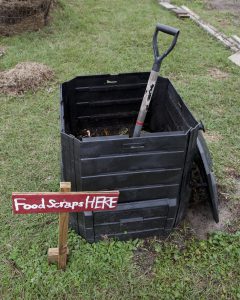
Food waste such as vegetable scraps can be added to compost to create a nutrient-rich fertilizer for home gardens.
(Photo source: Tyler Jones, UF/IFAS)
Compost them. Creating compost at home takes a little work and perseverance, but it can certainly pay off in the home garden. Nutrient-rich compost can add oomph to flower beds and vegetable patches and turn any garden into a showcase.
Vegetable scraps are perfect additions to any compost pile. Any vegetable scraps can be added to compost. Just remember to remove the little stickers, as those are not compostable.
According to the Environmental Protection Agency (EPA), there are many benefits to compost. It enriches soil, helping retain moisture and suppress plant diseases and pests. It reduces the need for chemical fertilizers. And it encourages the production of beneficial bacteria and fungi that break down organic matter to create humus, a rich nutrient-filled material. These fact sheets (this one and this one) from UF/IFAS Extension are a wealth of information about home composting.
The reduction of unnecessary food waste begins with us, the consumers. By learning how to use those scraps in useful ways, such as cooking and composting, we can help eliminate the excess food waste filling our landfills.
UF/IFAS is an Equal Opportunity Institution.
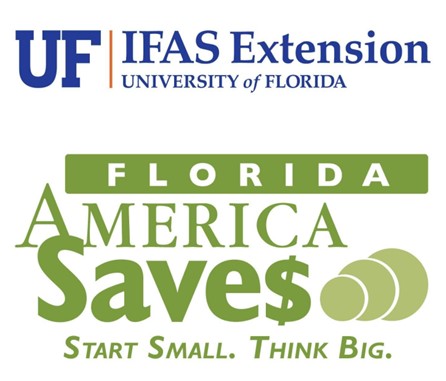
by Laurie Osgood | Apr 1, 2021
 April is designated as National Financial Literacy Month to increase awareness about financial literacy, especially with the Coronavirus (COVID-19) causing economic worry for families across the United States. When it comes to financial literacy, knowledge is power!
April is designated as National Financial Literacy Month to increase awareness about financial literacy, especially with the Coronavirus (COVID-19) causing economic worry for families across the United States. When it comes to financial literacy, knowledge is power!
Consumer debt has become a major challenge for families. If you owe money to multiple creditors, managing this debt can be overwhelming. Many Americans have more debt than they can afford to pay. Developing strategies for overcoming this challenge is essential. These strategies should include building financial knowledge, developing a budget, and setting savings goals to improve your financial outlook.
Financial literacy means understanding how to save, borrow, invest, and care for your money, leading to greater financial well-being. Research has shown that our physical health and well-being are directly linked to our financial health and well-being.
Florida Saves is a statewide initiative that helps inspire Florida families to set savings goals, lower debt, and build personal wealth. The Florida Saves pledge, located on the Florida Saves website, can help us establish personal financial goals. With this pledge, you’re making a commitment to work toward a savings goal, such as college tuition, an emergency fund, or down payment on your first home. Visit the Florida Saves Initiative website to learn more about financial literacy.
Whatever your savings goals are, becoming financially literate can help you achieve those goals. For more information about financial literacy and management, please contact your local UF/IFAS Extension Agent.
Extension classes are open to everyone regardless of race, creed, color, religion, age, disability, sex, sexual orientation, marital status, national origin, political opinions, or affiliations.
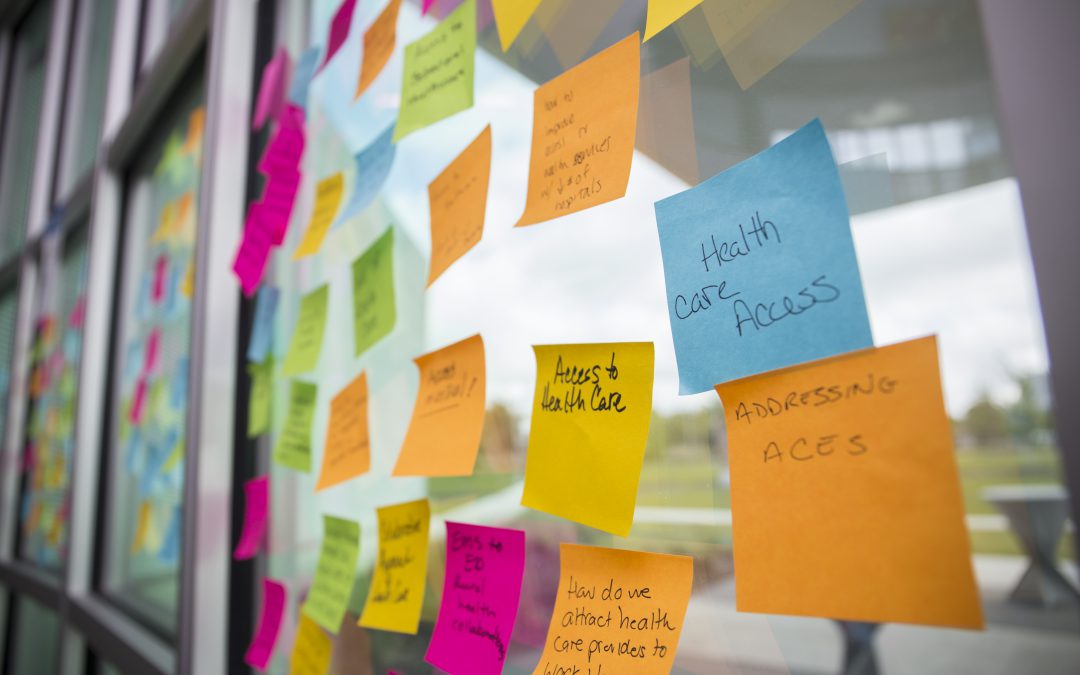
by Julie McMillian | Apr 1, 2021
Have you thought about your mental and emotional health lately? If you haven’t, it’s a great time to take some time to invest in you. Emotional wellness is the ability to handle and overcome challenges and obstacles that we often must deal with in everyday life. It doesn’t mean you will always be happy, but you are aware of and in control of your thoughts, behaviors, and actions when you have negative feelings or setbacks. Research shows that emotional health is a skill. There are many ways to improve and maintain your emotional health so you can adapt to changes as they happen.
Tips for Emotional Wellness:
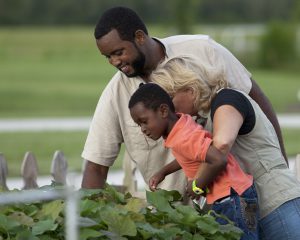
Spend time with loved ones to strengthen your relationship.
Photo credit: UF/IFAS
- Stay positive. Purposely develop a positive mindset and hold on to the positive emotions and appreciate the good times as long as you can. Focus on your outlook. Ask yourself: What gives me inner peace? What gives me purpose? Remember to forgive yourself and others for making mistakes.
- Reduce stress. Stress can push you to your limits. It can also motivate you with a rush of energy when needed. It is important to eliminate long-term stress, if possible, and strive for balance. Learn what relaxation techniques work best for you. Deep breathing, meditation, and exercise are healthy ways that could provide release. Set priorities and don’t be afraid to ask for help when needed.
- Take care of your physical health. Plan to eat healthy meals, get enough rest, and exercise. Your physical health directly relates to your mental health. There are so many things we want to fit into a day but there’s not always enough time. Establish set times to help keep you on track. Avoid too much caffeine, alcohol, and stimulants, especially late in day when it could affect your nighttime routine.
- Strengthen your relationships. Build strong connections with your partner, family, friends, neighbors, and co-workers. These social relationships help us to find purpose and meaning. Join a group focused on a favorite activity or hobby. Take a class and learn something new. Volunteer in your community and share positive habits with others. Others can have powerful effects on our health and link us to opportunity.
- Think before you act. Be aware of your emotions and reactions so you can harness them when you are triggered, or something is bothering you. Notice what makes you happy, sad, or mad, and take a few minutes to think before you address or try to change a situation. It’s okay to express your feelings to others and not keep everything within. We must be mindful of how it comes across or affects the other person. Take a walk or some deep breaths and allow yourself to process during a difficult time.
How you feel can affect your daily activities and relationships. People who have good mental health can still have mental illness, so remember to consult your doctor for ongoing concerns. There could be chemical imbalances that need the right kind of treatment. There are also counseling and support groups that can help when you need extra support. It’s up to you to start making healthy choices and taking control of your overall wellness. I hope you feel encouraged and take steps to develop resilience in the face of adversity. For more information on healthy living or other Extension-related topics, you can contact your Family and Consumer Sciences Extension Agent at your local UF/IFAS Extension Office.
Sources:
https://www.nih.gov/health-information/emotional-wellness-toolkit
https://edis.ifas.ufl.edu/topic_mental_health

by Kendra Hughson | Feb 21, 2021
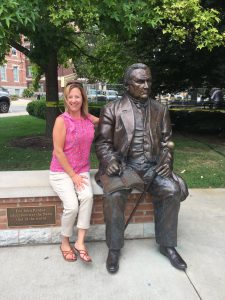
Kendra during her professional development leave at Purdue University.
Kendra Hughson is a Regional Specialized Agent in Family and Consumer Sciences. She is based in Quincy, Florida and covers the sixteen counties in the panhandle. Kendra leads the northwest district county faculty in developing districtwide family and consumer sciences programs. Kendra is also currently serving as co-chair of the statewide family and consumer sciences program.
Kendra began her career with Michigan State University Extension in a suburban county in southwest Michigan after completing an internship program in the county office. With a bachelor’s degree in family studies, she intended to continue her education in marriage and family therapy while working as an extension agent. Kendra caught the “Extension bug” and ended up completing her master’s degree in Family and Consumer Sciences at Western Michigan University.
Kendra was hired with the University of Florida/IFAS Extension in 2007 leaving the snow, ice, and frigid winters behind. She has served as an agent, a county extension director, and returned to her passion for family and consumer sciences as a regional specialized agent. Kendra works primarily in health and wellness but enjoys the variety of family and consumer science programs. She studied evaluation during a professional development leave in 2018 and has since been passionate about telling the story of how family and consumer sciences programs improve the lives of the people with which we work.
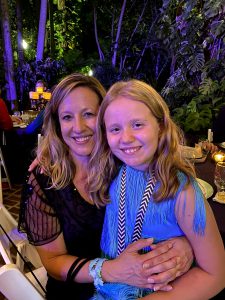
Kendra and her daughter in St. Petersburg, FL.
Kendra lives in Tallahassee with her daughter and dog. Kendra enjoys travelling, including playing tourist in the sunshine state and visiting Lake Michigan in the summertime. When not working or managing family activities, Kendra enjoys reading, cooking (not baking), sewing, and being outdoors.

by Melanie Taylor | Feb 1, 2021
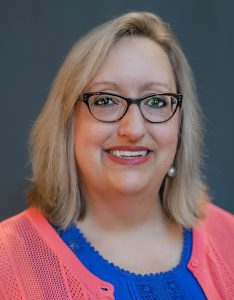
Melanie Taylor, Family & Consumer Sciences, Extension Agent III, Bay County
Melanie Taylor grew up in Virginia. After getting married in January 2009 and wanting to support her husband’s career in Panama City, she officially moved to Bay County. Melanie received her bachelor’s degree from Radford University. She then furthered her education with a M.S.Ed from Virginia Tech in 2004 while working full time for Virginia Cooperative Extension. She followed in her Dad’s footsteps by becoming a 4-H youth development Extension agent and worked with Virginia Extension for over eight years. Upon moving to Bay County, she worked in Gulf County as the 4-H and Family & Consumer Sciences Extension Agent for 10 years. She transferred to UF/IFAS Extension Bay County in December 2019. Her FCS focus areas are health and wellness, prevention of chronic diseases, and strengthening families within our communities.
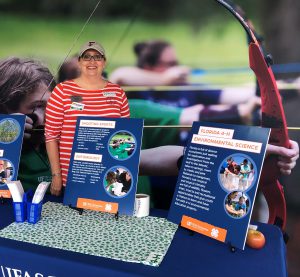
Melanie at the 4-H booth at the Sunbelt Expo
Melanie is very excited to now work within the community in which she lives and to assist with helping Bay County residents recover from Hurricane Michael and Covid-19 damages. Be sure to contact Melanie if you have any needs in the area of family and consumer sciences. She is ready and willing to answer questions and design programs virtually for now and face-to-face in the future.
Like so many in Bay County, Melanie’s home in the Cove was severely damaged by Hurricane Michael, but she is excited to announce they finally moved back into their repaired home on September 26. She and her family could not be happier (her family includes husband Bryan and their two cats, Sonny and Cali). Outside of work, Melanie is active in the Junior League of Panama City. It is very likely you will see her out and about with her husband at local events.
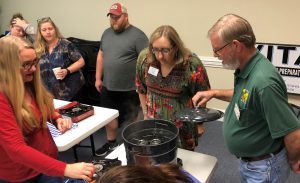
Melanie Taylor, Family & Consumer Sciences, Bay County













